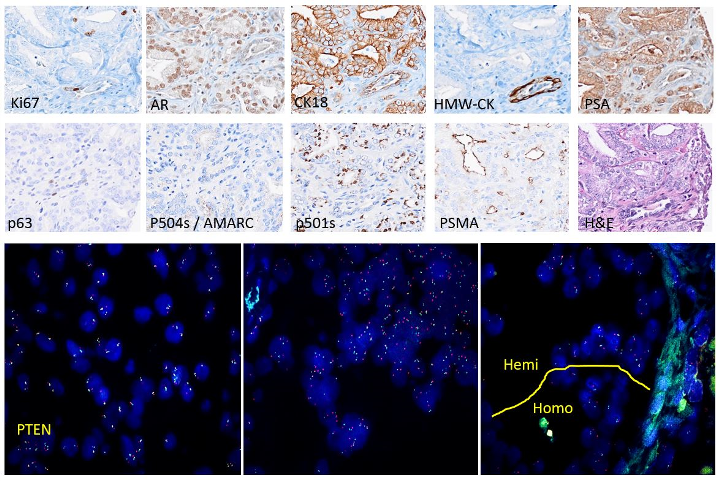A TFRI pan-Canadian research team has created a new biomarker resource that could help personalize treatments for patients with prostate cancer. The resource addresses an urgent need of clinicians for better tools to assist in identifying patients with aggressive versus indolent disease and to guide treatment decision-making.
The tissue microarray (TMA)-based resource presented in BMC Urology (September 2018) is a robust new platform comprised of 1,512 high-quality radical prostatectomy specimens gathered from biobanks in four provinces across Canada. It has been deemed to be highly representative of the Canadian prostate cancer population, is richly annotated and has a long-term follow-up, making it an extremely valuable resource for researchers around the world looking to validate biomarkers that could help clinicians differentiate aggressive forms of prostate cancer from indolent ones.
This type of validation is much needed. That’s because some prostate cancers are aggressive and lethal, requiring invasive treatments that often yield life-altering side effects, while others are indolent, meaning treatment may not even be necessary. By using biomarkers to stratify aggressive cases from indolent ones early on, pathologists and clinicians will be able to provide personalized treatments that are effective and that don’t have an unnecessary impact on a patient’s quality of life.
“There’s an urgent need for biomarkers to help clinicians properly distinguish patients with a higher risk of progression from those with a non-life threatening disease,” said urologist Dr. Fred Saad (Centre de recherche du Centre hospitalier de l’Université de Montréal), a Montreal-based researcher who leads the TFRI’s Canadian Prostate Cancer Biomarker Network (CPCBN), which conducted the study. “This TMA-based resource is a step towards that and could have a long-term benefit for prostate cancer patients by providing pathologists and clinicians with additional biomarkers that will help patient stratification.”
The resource is already one of the most robust of its kind in the world, providing insight into the three major endpoints in prostate cancer – biochemical relapse, development of bone metastasis and prostate cancer specific mortality. It will only improve over time as any researcher who uses it will be required to send back results to the CPCBN for the creation of a nomogram that includes the best clinical and pathological biomarkers that could help decision-making in the near future.
“This platform serves as an invaluable resource for the entire prostate cancer research community, accelerating breakthroughs in PC research, and supporting the establishment of nomograms to predict patient progression,” said Dr. Saad.
The CPCBN project was co-funded by the Canadian Partnership Against Cancer (CPAC).

Study
The Terry Fox Research Institute Canadian Prostate Cancer Biomarker Network: an analysis of a pan-Canadian multi-center cohort for biomarker validation
Authors
Véronique Ouellet, Armen Aprikian, Alain Bergeron, Fadi Brimo, Robert G. Bristow, Simone Chevalier, Darrel Drachenberg, Ladan Fazli, Neil E. Fleshner, Martin Gleave, Pierre Karakiewicz, Laurence Klotz, Louis Lacombe, Jean-Baptiste Lattouf, Theodorus van der Kwast, Jeremy A. Squire, Mathieu Latour, Dominique Trudel, Anne-Marie Mes-Masson and Fred Saad
Funding
This work was supported by funding from TFRI and CPAC to the Terry Fox Translational Research Program titled Biomarker-Driven Management of Prostate Cancer Phase II